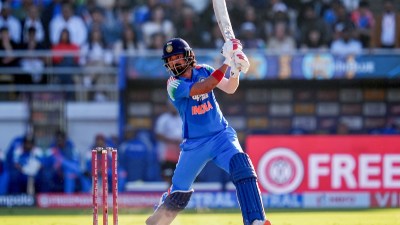It146;s got to do with IT
In New Delhi, many saw American pressure as being behind India8217;s withdrawal of the ban on Pakistani flights over Indian airspace. Actua...

In New Delhi, many saw American pressure as being behind India8217;s withdrawal of the ban on Pakistani flights over Indian airspace. Actually, it was India8217;s Information Technology secretary Rajiv Ratan Shah who exerted pressure on the government to throw open Indian airspace and call back Indian warships to their bases.
The Government realised that several information technology firms were in high panic because of the war hysteria and a number of foreign investors had even threatened to move to China, Malaysia and Indonesia. An estimated creation of 30 lakh jobs at home was at stake.
Though the worldwide recession has burst the dotcom bubble, India continues to be the global hot spot for call centres and information technology. Several American and European investors have set up joint ventures with their Indian counterparts and many more are lining up. With so much at stake, Indian investors hit several panic buttons at the same time.
The Information Technology secretary moved swiftly to convince the Government that a positive message had to be sent out to rebuild confidence among investors. Even otherwise, Air India was expending a great deal of extra fuel because of the detours caused by the corresponding ban over Pakistani airspace. External Affairs Minister Jaswant Singh too played a proactive role in the decision. However, troops will continue to be deployed at the border until the J038;K Assembly elections, but New Delhi does plan to scale down artillery shelling.
Taking us seriously at last
The welcome change in the American mindset has not gone unnoticed. Be it Colin Powell, Richard Armitage or Donald Rumsfeld, the top US diplomats visiting the subcontinent have agreed that Pakistan has been carrying out infiltration and cross-border terrorism.
In fact, when Rumsfeld came to India with a list of prescribed steps for de-escalation and confidence building measures, he was surprised to learn that India has a similar list ready. He was also told that India could only proceed with its plan when General Musharraf8217;s promises translated into reality.
Contrary to media reports, Rumsfeld never suggested the idea of patrolling by US forces along the Line of Control. In fact, Rumsfeld expressed surprise at such speculation and ruled out the possibility of aerial surveys on such hostile terrain.
However, there have been proposals of installing US equipment to set up monitoring centres and other measures like exchange of intelligence.
The US has reason to be happy with Musharraf, particularly after he permitted US forces to conduct searches for Al Qaeda fugitives inside Pakistan.
Yet, Washington is aware that the fugitives enjoy some degree of protection. The US has also been informed by Indian intelligence that there are dozens of Al Qaeda activists operating inside Kashmir.
Washington doesn8217;t trust the ISI and it suspects a presence of a number of officers with Al Qaeda links even after the recent overhaul. When Advani went to the US, intelligence officials at the Nevada Research Centre briefed him on infiltration across the LoC.
And when Rumsfeld asked Advani in New Delhi if India perceived any change in the situation, the Home Minister accepted that there was one palpable change: the world has finally recognised that Pakistan has been engaged in infiltration and cross border terrorism.
Two bad for Najma
It8217;s tragic that equations that are not strictly political dictate our discourse. Consider Rajya Sabha chairperson Najma Heptullah8217;s case. Despite her impressive track record, she is likely to miss another opportunity to become Vice President.
Najma has been chairperson of international bodies like the International Parliamentary Union. Members of the ruling coalition and the Opposition alike respect and admire her. Being a Muslim, she also satisfies one of the not-so-politically-correct requirements of Indian politics. Ironically, that very factor spoilt her otherwise bright chances.
With Dr Abdul Kalam in Rashtrapati Bhawan, Najma as Vice President would be one Muslim too many for our political system. The same logic spoilt the party for Farooq Abdullah. In view of his political sabbatical as Vice President, Farooq had plans to move his son Omar to the Valley. But as things stand now, Farooq8217;s chances of becoming Vice President have become as remote as Najma8217;s.
- 01
- 02
- 03
- 04
- 05































